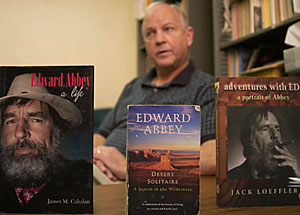 |
|
DAVID HARDEN/Arizona Daily Wildcat
|
Robert Houston, a creative writing professor, was a friend and colleague of Edward Abbey, a former UA professor known for his unique views of the West.
|
|
|
By Jessica Lee
Arizona Daily Wildcat
Monday, March 22, 2004
Print this
Famed Southwestern writer and former prof still important to UA
When Edward Abbey began teaching creative nonfiction at the UA more than 20 years ago, students were rushing to sign up for the class. But many of them weren't interested in improving their writing skills.
To them, Abbey was more than a writer. He was a guru.
"They were just some groupies who just wanted to sit at his feet," said localauthor Tom Miller, who was a professor at the time.
Abbey, who taught at the UA for most of the 1980s, had already established himself as one of the West's great environmental writers by the time he arrived at the university.
And though the 15th anniversary of his death passed last week, many people, including those close to him during his years at the UA, say his environmental legacy lives on in classrooms across campus.
"He brought that kind of content that involved various elements around campus ÷ the environmentalist movement, for example," said Robert Houston, professor and former director of the Creative Writing Program. "He's become legendary."
Abbey joined the faculty in January 1981 at age 54. He already had 14 books under his belt.
In the classroom, Abbey was not the figure his fans had come to know through his novels. Professor Abbey was there to instruct the students who were serious about becoming better writers.
"He was very generous with his time, but he was a tough teacher. He had that laid-back manner, but he was very strict about good writing and would not put up with a lot of nonsense," Houston said.
Nancy Mairs, a Tucson essayist, took two of Abbey's classes during her tenure as a creative writing graduate student.
"He was not a polished or diplomatic teacher. He was upfront and said what he thought. I had not written essays before, but immediately he was very encouraging and supportive," Mairs said.
Houston and Mairs said they recognize Abbey's contribution to the program.
"He legitimized creative nonfiction. It was sneered at before because it wasn't considered real creative writing," Mairs said.
While Abbey had a devoted following, many of his readers and colleagues disliked his crude personality, controversial opinions and apparent sexism.
Mairs, a self-declared feminist, often used feminism as the subject of her class assignments. While Abbey always encouraged her to write, he often gave her sexist comments on her essays.
"He hated the stuff I wrote because he hated feminism. He told me, ĪStop wasting your time on this feminist crap,' but he never told me to stop writing," Mairs recalled.
Judy Temple, an associate professor of English and a women's studies associate professor, agreed that Abbey's "confused feelings about women" led to his chauvinism.
Temple includes Abbey in her curriculum. Her class analyzes his introduction to Mary Austin's "Land of Little Rain" as an example of misogynist writing.
"Ed Abbey wanted to protect nature for able-bodied men to enjoy," Temple said.
Houston, who was a close friend of Abbey, disagrees.
"That's silly political correctness. Some of (his sexism) is persona. When you got down to him, one-on-one, he wasn't," Houston said.
In the late 1970s, Abbey began contributing his writings to UA Special Collections.
Roger Myers, librarian and archivist in Special Collections, receives monthly requests to view documents from Abbey's collection.
"It is a rich and valuable collection," Myers said. "It is very important because our Special Collections want to document Arizona and its history. Abbey was a major contributor to that."
David Laird, a former university librarian, also gathers and organizes Abbey's documents in the collection.
"It pleased him that a large research institution would want to preserve his stuff," Laird said.
Fifteen years have passed since Abbey climbed the stairs of the Modern Languages building, leaving a whiff of cigar smoke in his wake. But the works he left still inspire readers to rethink the impact of development on the West.
Eric Nebel, a fifth-year architecture student, is immersed in his senior capstone project, which he says was influenced by Abbey.
The project, titled "Beyond the Wall," borrows the name of Abbey's collection of essays.
"His nonfiction became an important immersion of landscape into novels," Nebel said.
Nebel spent every weekend last semester hiking in the desert before he began his work on a temporary dwelling that he imagines will one day rest within the housing development in Ventana Canyon.
The dwelling would personify the clash between golf courses, nice homes and the urban Tucson vista and the wild canyon that lies beyond, he said.
"It defines the boundary where urban ends and landscape begins," Nebel said.
Abbey is known for writing about how the West was being lost to development. "Growth for the sake of growth is the ideology of the cancer cell," Abbey wrote.
Many argue Abbey's crusade to protect the natural landscape is important today.
"Our federal government is in a rape and pillage mode, so Ed's message is even more important than ever," Laird said.
From her experience as one of Abbey's former students, Mairs stresses that everyone should make time to read Abbey's work, especially "Desert Solitaire."
"There are ideas in Ed's work that are right now very much under fire," Mairs said. "I hope students are looking seriously at Ed's work and other environmentalist writers to see there are alternatives to the current
political climate."
